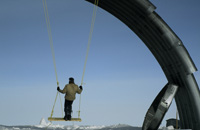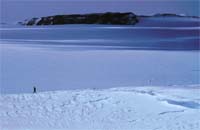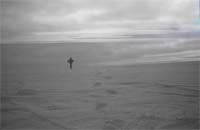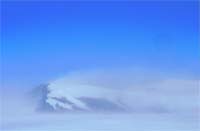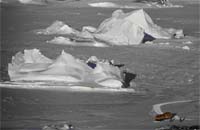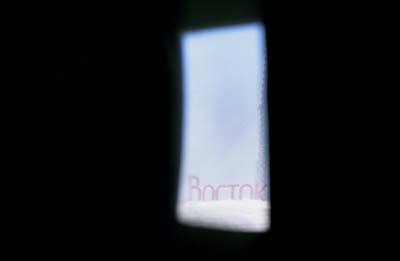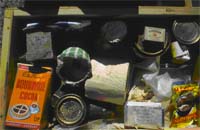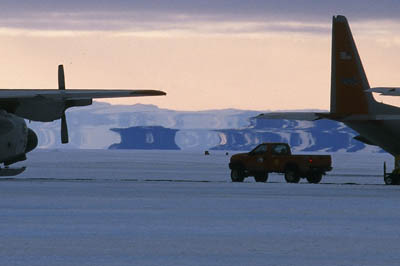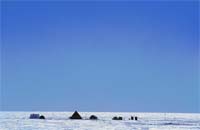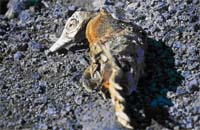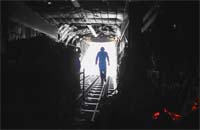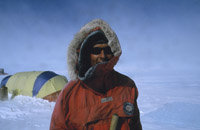Song of Hypothermia
originally published in The Missouri Review, Fall 2005

There's no such thing as being out of the wind in the Antarctic. We inhabit a barren continent buried under mile-deep ice and shaped by the cold gales of millennia. Katabatic winds plunge down to the frozen coast like an endless train falling off its tracks. Here on the Odell Glacier, sleep comes under a steady barrage of twenty-five-knot gusts that struggle to erase our little nylon home on the ice.
It's early November, and Julian and I have set up camp in the Transantarctic Mountains, two men isolated for three months of the Antarctic summer. The south polar sun will not set during our three months, instead spinning above us like an anemometer. And already it seems that the wind will be a very busy neighbor: our little tents creak, our little tents hum.
We have two goals out here: first, to build and maintain an emergency runway on the glacier. McMurdo Station, the main base for the USAP (United States Antarctic Program), needs an alternate landing site for the large Hercules aircraft that bring cargo from New Zealand or move it around the continent. Several times each summer, storm or fog makes Herc landings in McMurdo too dangerous. Our other goal: to keep each other sane, with only ourselves for company for the next ninety days. Our camp is on the edge of the five-mile-wide Odell Glacier, snug under the shadow of a steep dolomite ridge of the Allan Hills. The sloping edge of the glacier and a curve in the hills make a small cove that offers us some protection. The gusts baffle around our neighborhood of blue ice and brown stone; winds shudder and fall into the cove rather than racing through. Because of the shuddering, snow drops out of the flow and drifts up against the rocks. This we shovel out and melt for water.
We don't know how difficult the katabatic winds will be this summer, but we have to plan on the worst-day after day of tent-thrashing. Though Julian and I plan to look around further, in a few preliminary trips out here last summer, I found no better hiding place on the glacier. Which is too bad because after only a few hours on the Odell, everything we own is tied down and shaking. Katabatic winds are avalanches of air. They are the characteristic winds of Antarctica, far more common here than elsewhere. The word derives from the Greek katabatos, "descending." The high reflectivity of the white ice sheet reflects most of the sun's heat, leaving intensely cooled air on the surface, which then slides down along the curve of the ice domes. These gravity-driven air masses fall hundreds of miles down from the bitterly cold East Antarctic plateau over smooth surfaces of snow and ice. They howl most fiercely when squeezed down narrow glaciers (like the Odell) between nunataks, the visible peaks of mountains otherwise submerged by ice. The Allan Hills, like other nunataks, shape and are shaped by the winds.
Katabatics begin and end abruptly. They are ragged and gusty, arrive under clear skies and may easily last days or weeks. They blow nearly continually in the most afflicted areas: Douglas Mawson's 1912 winter quarters in Commonwealth Bay shook constantly in katabatics averaging fifty miles per hour through their first year, with gusts of over two hundred miles per hour. In Home of the Blizzard, Mawson wrote of this time that they "dwelt on the fringe of an unspanned continent, where the chill breath of a vast, polar wilderness, quickening to the rushing might of eternal blizzard, surged to the northern seas. We had discovered an accursed country."
As I lie in my only slightly accursed tent on our first Odell evening, on the fringe of our now-spanned continent, I mull over my last harried words to friends in McMurdo: "You can go to MacOps and call the Odell on the radio or you can email a tiny text message to our satellite phone. Or I can radio in and MacOps can connect us with a phone-patch. Otherwise, see you for a couple days at Christmas. I think." MacOps is the communications center for McMurdo, handling calls by phone, sat phone, High Frequency (HF) and Very HF radio. It's our link to the rest of Antarctica, and to the world.
And I worry again about how to secure our camp against a summer of wind. Julian and I have brought a protective arsenal of ice screws, cargo straps, ice augers, rope and bamboo stakes. Tying everything down will be our best defense. Tents, storage boxes and equipment will all be stitched into the glacier.
Old Antarctic yarns of starvation and storm come to mind, all those lovely stories of explorers spending days under snow-collapsed tents, weeks trudging through ground blizzards, months in soot-caked ice caves. With our modern equipment and ample food supply, we no longer have much in common with those men, but their tales still frame how we see ourselves here. Men like Mawson and Ernest Shackleton were literate survivors who told the world how this place took its toll on the mind and body. "Self is a subject we are fluent on," wrote the trudging Shackleton, and for those few of us who live for extended periods in these hinterlands, where little exists beyond what we bring with us, the raw self still swells to fill the emptiness.
Hours tick away in my quaking tent, under a sun that will turn and turn sleeplessly above Antarctica until the twilight days of March. Between gusts, the sounds of Julian rustling around in his tent edge across the ice. Curled up in my sleeping bag (rated to minus forty degrees on a minus-five "night"), as I shift my body on this hard ice, I feel the onset of the familiar Antarctic amnesia, the shift away from the world. America, forests, family and even McMurdo fade from memory. This is the only place there is.
Eventually, in the soft coffin of my sleeping bag, the call to sleep takes me deeper than the song of hypothermia can reach.
Julian and I arrived by Twin Otter, a small bush plane, ready to set up house with several tons of gear and food. The Otter had taken a load without us earlier in the day, and helicopters had slingloaded our snowmobiles and fuel barrels a few days earlier. We spent a few weeks in McMurdo, making lists and preparing for this summer in the icescape. Food, gear, comms equipment, transport and much more had to be planned, found, arranged, replaced, double-checked and packed. Every detail of my trips must be sorted out beforehand. It's embarrassing to send the plane back for a can opener.
The Otter pilots (two Arctic-experienced Canadians) ignored my lists and simply hurled our stuff into the plane, squeezed us in and took off. To us the Otter is a delicate machine soaring between the ever-present sun and a cold white mirror; to the pilots it's a station wagon with wings. Contemporary Antarctica is known for its wilderness of ice, its wildlife and the science that studies both. What few people understand is that most of the continent supports no wildlife and that three-quarters of the people in the USAP are not scientists. Most of us are workers in McMurdo, a makeshift, purpose-built town that supports the science program and sustains itself. We are Dining Attendants, Carpenters, Fuels Operators; we drive forklifts, file reports, supervise or shovel. Only a few of us are actually carried out each summer by plane or helicopter to remote sites to create and run small camps in the frozen nowhere. I've worked up to these remote jobs after stints in McMurdo's Waste Management and Fuels departments, after frustrating summers of flirting with the Antarctic fringe. This Odell job is the opportunity I've hoped for since I first arrived from the warm world in 1994.
Julian and I just met two weeks ago. The friend I had hired dropped out at the last minute, and Julian, on the recommendation of a mutual friend, was willing to fill in, landing in McMurdo a week after me. Born English, but a Californian since childhood, he's a natural gentleman with a passion for surfing, and unselfconsciously well-mannered. Julian smiles at least once in every conversation and manages to wear even our puffy insulated clothing like a pressed suit.
Antarctica is in his blood: he's a descendant of Captain William Colbeck, member of the 1899 Southern Cross expedition, the first men to spend a full year on the ice. Julian has been working off and on in the Antarctic since 1988, coming back only when it felt like a new adventure rather than another summer on the job. At six feet five inches, he's four inches taller than me and has a slight tall-man's stoop that adds to the impression that he bows gently when speaking.
Our new home, the Odell, is one of Antarctica's rare "blue-ice" glaciers. On this part of the continent, the Transantarctic Mountains interrupt the flow of the East Antarctic ice sheet heading toward the Ross Sea. The ice sheet has nearly overwhelmed the mountain range, however, sending massive threads of ice down between the still-exposed peaks. Nearly all these glaciers, like the rest of the continent, are covered with snow. But on the Odell, persistent winds sweep snow downglacier. From the air, the unveiled blueness is a visual reprieve from the endless shades of white that lace a continent the size of China and India combined. What this means for the planes is that we have a good hard landing surface. And for Julian and me, it's a good hard place to live. When we arrived, the wind was blowing twenty knots and increasing. At our new altitude of 5500 feet, the temperature was a balmy zero degrees Fahrenheit, though twenty degrees colder than McMurdo. The wind-chill made it about minus twenty-five. When I called MacOps to say we'd arrived safely, I had to make a closet out of my parka to dull the wind's whistling through the satellite phone. My hood flapped behind my head. Our quiet Canadian pilots smiled and shrugged, helped us offload our gear and left for their beer and warm beds back in town.
Julian and I were two miles from the campsite (as close as the Otter could land), 120 miles from McMurdo and possibly ninety days from a shower. Our best estimate is that the nearest humans are in the Dry Valleys somewhere, about sixty crevassed miles away. We set up our separate sleep tents and the stout canvas Scott tent (which serves as both outhouse and emergency shelter), but the much larger and heavier Endurance tent, our eight-by-sixteen-foot living space, would have to wait for better weather. Julian looked around at the wilderness of ice, sky and rock, looked at all our stuff and said in an understatement either English or West Coast, "Well, I reckon this will keep us busy for a while."
Within an hour, I almost knocked Julian senseless. As we motored up over a three-hundred-foot rise in the glacier, the heavily laden sled that I'd hastily hitched to my snowmobile rattled free and began racing down a steep ice slope to a wall of rocks. It contained all of our essential camping gear, including our stove and gasoline. Julian nimbly brought his machine up against the lower side of the sled to slow its descent. I dropped down to pin the sled between us but came too hard, and slammed into it hard enough to send my companion for the next ninety days sprawling. The sled took off again, but I hesitated in my pursuit until I heard Julian yell that he was fine. There was nothing I could do, though, as all the makings of home slammed into a waiting boulder ahead of me. Luckily the collision had been eased by our efforts, so the sled bounced, shivered, and then stood like an errant pony waiting for instructions, a few feet to the right of a much longer fall and probable disaster. I clipped the sled back onto my hitch, Julian saddled back up, and we headed off to build our new home. Luckily we were busy enough that it was several hours before Julian remembered the crisis, and by then even he thought it was funny.
This is the only place there is. Like fingers of an ungloved hand, our memories of the world we've left behind are the first part of us to go numb in the cold. All the horror and charm in the flood of worldly news will simply drop out of our lives. What happens to us here will be too foreign and too intense. All the news we'll need is twenty-four-hour coverage of the weather.
Dec. 30: Serious katabatics have finally arrived. They've been blowing down the Odell for three days, each day growing a little stronger. It's now too windy for Julian and me to enjoy walks across the scathed fields of ice and stone, and too windy to work. The sound of winds tearing through the rocks on the ridges above us is identical to that of distant waves raging on a hard shore. There are moments when the wind skips over our buffered camp; in those calms, together in the thin-walled Endurance tent, we hear the ocean of wind slowly dismantling the nunatak. Julian manages a "Surf's up, dude" and a smile before settling back down to another book on his cot. He lies down a lot because it's no fun to stand up: when we set up the Endurance for the first time, we realized to Julian's horror and my amusement that even the highest point in the tent, at six feet, three inches, is too low for him. We had ninety days of stooping ahead of us, including many long tent-bound days like today.
We've had seven pleasant weeks of mostly moderate winds since we arrived. For three weeks we worked long days to make our primitive runway. We cleared off what few patches of snow still clung to a relatively flat six-thousand-foot strip of blue ice and then marked the perimeter and the line of approach with a few hundred flagged bamboo poles. Our work depends on a small Kubota farm tractor, outfitted with a rototiller to chew up the rock-hard snow patches and a snow blower to whisk the snow downwind. Once in the air, the snow flies for miles. On calm days, Julian and I took turns using the tractor's bucket to smear the snow across the ice. Soon after, the wind picked up and picked it up, slithering it toward the coast.
On one perfect, windless day of work under the constant presence of a double solar halo, sundogs and arcs made a chandelier around the pirouetting sun. A sun pillar connected our suddenly strange star to the Earth. A steady fall of fine ice crystals, if such bright specks can be said to fall-they seem to be air molecules turned on their metallic edges-hung like tinsel over us, the tractor, the empty runway and this minor kingdom of ice.
That the safety of crew and passengers depends on our little orange tractor and our rough, untested airstrip both amused and disturbed us as we used our auger to drill hole after hole into the glacier. We made nice straight lines on this icy ground amid the geographic chaos of the Transantarctics, hoping that pilots and plane would be able to nose up into the gale and set down happily on the fields of the Odell.
Since it's been operational, we've simply maintained the runway against storm and gale and called in weather reports to McMurdo's forecasters. One massive storm dropped more snow on the airstrip than we began with, but we blew that soft stuff away in the week it took McMurdo to dig out of head-high drfts. Now we're just "camping for cash," as Antarctic field work is sometimes called, and each day we fall more in love with life on the margin of the planet. We've had ample time to roam, cruising the Odell and nearby glaciers by snowmobile and walking many miles through the stony valleys of the nunatak.
Things have been very quiet in our cold Shangri-la: ours is just an emergency runway. So far, no Herc has been desperate enough to use it. But we had a lovely three-day Christmas visit to McMurdo, which was a welcome respite among friends and central heating. We arrived back here just in time for the worst katabatics of the summer.
Now, when thirty-five-knot gusts hit our camp, they pull a low moan from a split piece of bamboo that supports our HF radio antenna. The moan rises and falls with the wind in an imitation of a distant foghorn, a sound that calls me back to my home on the coast of Maine. Maine's furrowed shoreline still shows the scars of a massive glaciation that ended a mere 12,000 years ago, at a time when the Allan Hills and the Odell looked and sounded very much as they do today.
All of Antarctica is a "ventifact," an object carved by wind. Not an ice crystal is as it first fell. The surfaces of this terra firma-snow, ice and stone-are all maps of old wind. Only .4 percent of Antarctica is neither ice nor snow covered. These dashes of land consist of raw peaks, rare "oases" like the Dry Valleys (where ecosystems contain only a few simple organisms, such as nematodes, algae and endolithic lichen), and the few mustaches of moraine that dot the coast. These exposed corners are slowly being pulled apart. Bedrock is fractured into stones, and then pebbles, by wind. Helped a little by freeze-thaw cycles, wind is the dominant erosive force in the scarce ice-free margins of Antarctica.
Here in the Allan Hills, cobbled valley floors and broken ridges glisten for the very rare visitor, their surfaces polished by centuries of sand streaming over them. The grains of sand are themselves the final products of wind.
A walk through one of the more blasted areas shows not just a sculpture garden of furniture-sized ventifacts, but also that nearly every facet of every stone larger than a knuckle has been smoothed, grooved, holed, arched, split or generally beaten into submission.
On our first long walk across the Mars-like landscape of the Allan Hills, Julian and I moved in silence, full of gratitude and wonder, astonished that hundreds of otherworldly square miles of stone and ice were ours to explore. We frequently bent down to pick up ventifacts, each one oriented to the prevailing wind. I smiled as I saw Julian reaching down to place a stone precisely back into its millennial niche, where the wind will flow over it as before: I've developed the same habit down here. The dense timelessness of the Antarctic seems to require it of us.
We hope, as Julian said when I commented on our shared ritual, that a little respect goes a long way.
Jan. 8: Fierce wind is now a continuum here in the mountains. It increases in strength daily (it's now at forty-five knots around the tents), the barometer rises with it, and the sky is the most barren pale blue I have ever seen. The temperature might be a warm twenty degrees if the warmth reflected by the land weren't sucked downslope and thrown out to sea. These katabatics are not marked by cloud or storm and feel more like a flood than a flow of air.
Twelve days ago, the dam broke somewhere deep on the East Antarctic plateau, and now masses of cold, dense air spill and spill down through the glacial slots between nunataks, every day shivering our little nylon outpost.
Our sled is staked, and has been for days. Otherwise it spins like a weathervane or flips over, sometimes skidding around alongside the moving snowmobile.
In the Endurance tent, where we spend all our waking hours day in and day out, I keep my notebook handy to scribble down phrases about wind and waiting. Both of us sleep and read, sleep and read. And eat: a huge box of fresh vegetables intended for Siple Dome, an often fogged-in camp with several mouths to feed, was diverted to us just before the katabatics hit. Julian and I are fighting a losing battle to consume them before they freeze. We take turns standing at the propane Coleman stove, making hash browns or stirring greens into refried beans and spaghetti sauce. We sleep with cucumbers and cabbages tucked into our sleeping bags.
This is not the first time wind and weather have cornered me down here. Deep in East Antarctica, in 2000, at a very remote speck called AGO 1, a thirty-knot ground blizzard (at minus thirty-five degrees Fahrenheit) came up an hour after our arrival and pinned our three-person team down for thirty-six hours. In West Antarctica, at the Ford Ranges camp, a storm raced in and confined the six of us to our tents for two days, immediately after we'd packed up the entire place.
Not long ago, my appendix flared up just as a three-day storm buried McMurdo and its runways in drifts several feet deep. An ambulance carried me over half-plowed roads to the New Zealand-bound plane, five days after I doubled over.
Meanwhile, our runway is as lonely as the rest of Antarctica. It serves no one but us. We expected some test landings, but it turns out that Air Force regulations prohibit landing on emergency fields without an emergency. Early in December, while it was being decided whether these regulations applied to Antarctica, Julian and I watched from our snowmobiles while a Herc jauntily buzzed the field a few times, as if window shopping. Now the rumor has reached us that many of the Herc pilots would rather land blind on McMurdo's known runway than gamble on our last-ditch option. Our friends in MacOps have told us quietly that there have been a few close calls in McMurdo, when a plane should have diverted to us from the coastal fog and storm.
The Herc crews wouldn't be happy out here in these katabatics, anyway. Landing would be for them a manifold crisis: we have no facilities for the men, and no way to anchor their winged warehouses from skittering backward across the ice.
A day's worth of bone-chilling work while my fingers and toes shut down adds some context, however minor, to an understanding of the first Antarctic explorers. To taste a little polar hypothermia, even with a warm tractor or tent between me and the white emptiness, puts me in mind of their expeditions' terribly thin buffer between living and dying. The fact that I can be comfy in a few minutes keeps me outside, stoically thinking of the months in which men like Shackleton could not, with their inadequate clothes, gear, and diet. It's a wonder that misery didn't overwhelm them. Strength in the cold is more a matter of resignation than resistance. We don't become immune to the biting wind so much as we become used to feeling cold. I allow Antarctica into me because the little puff of heat that is me means nothing to Antarctica. My perception of cold adapts, not least because my perception here has been carved by wind.
My very first recreational walk on the continent, back in 1994, took me into a wind chill of minus one hundred degrees Fahrenheit. Fingers and toes numbed quickly, and over the next six miles my face muscles turned to pottery while my skull felt clamped in a vise. The world was reduced to the small view through my fur-fringed parka hood and framed by an obsessive internal monologue on what I could feel and how far I had to go.
The Antarctic is so austere that our experience of it can often be reduced to psychological elements alone. The list of things we do and don't perceive is reduced, always, to two categories: Awareness Formed By Cold, and Awareness Numbed By Cold.
Jan. 10: The worst katabatics so far have hammered camp today, Julian's birthday. We've had nearly two weeks of intensifying winds. So we're spending another stay-in-camp day, eating the thirty-nine cookies I baked for him last night. Every few hours we go out to re-tighten the dozens of tie-down lines for the tents. The anemometer reading began with an acceptable forty-five-knot maximum but has increased quickly through the day, each gust breaking the back of the one before it. Inside the Endurance, we've boxed up all our small, light and valuable stuff, in case the tent splits open. All our papers, loose cooking supplies, spare clothing and various sundry items now look like prospective dust for the gales that might shred the tent walls.
Our food cache and stove in the sturdier Scott tent make the worst-case scenario more of a hassle than a hardship. The bad news is that if we move into the Scott from a destroyed Endurance, our little indoor toilet will have to be moved outside.
At least one other remote group is having a rougher time. The meteorite hunters are hunkered down on the edge of the ice cap, unable to move. They've lost at least one tent already. Earlier I ventured out to see what was left of our runway markers. On the two- mile journey downwind, spindrift raced past me, snowmobile exhaust tumbled with it, and small ice chips kicked up by the machine's spiked tracks leaped over my head in their wind-driven frenzy.
Very few bamboo poles, of the hundreds we put in, are still whole. A lot of them have shot down the glacier somewhere, broken off at ice level. When the weather allows, Julian and I will have to pick up the pieces and chip out what's left: jagged little tubes of wood embedded in the glacier. Back in camp, the tent fabric snaps far too loudly, erratically, against the aluminum frame. Conversation is minimal. ("I'm going to take another nap." "What? Oh, okay.") But we catch each other's eye each time the wind ratchets up a notch, waiting to see if the tent will hold.
Late in the afternoon we can't resist stepping outside and taking another measure of the wind speed. I take a wide stance with my crampons and lean back against the wind, holding the anemometer above my head. The birthday boy stands behind me and to my right, looking over my shoulder at the digital read-out. As we wait for a strong gust and muse (loudly) about how much wind it would take to move a human body against its wishes, we are suddenly thrown off our feet and blown like rags through camp. We slide a hundred feet across the ice. And despite the fact that we moved with the gust, the anemometer still reads fifty knots.
Wind is audible only because there are things in its way. Across most of Antarctica there are no trees, no phone wires, only undulations in snow and ice. From this pure surface comes the pale sloughing whisper (do we imagine it?) of crystal against crystal, of this white sand resting and not resting.
We are the inescapable, mobile distortion: our bodies, with exocranial ears that freeze as they listen. The air grows turbulent in our presence. We strain to hear silence but become instead the microphone and rustling loudspeaker.
Jan. 11: We woke to the result of the wind's feeding frenzy. Last night, a few boxes of food were shoehorned out of our cargo line and scattered down the glacier. Very frozen pizza crusts shattered and slid out of sight like jagged little pucks. A puffy bag of chips has probably reached New Zealand. Both of us are pissed that we've sent litter whistling through the wilderness, but we've recovered everything we can for now.
McMurdo's forecasters have told us that their automated weather station a few miles away from us is no longer communicating with them. Either the station or the relay antenna on nearby Mt. Brooke has been ravaged by the katabatic. Someday, when the weather allows, we'll investigate. Unbelievably, the wind has continued to increase. The tents are warmed by the passive solar energy of twenty-four-hour sunlight, but as they shudder in the mad slaps of wind tumbling off the hills, that warmth dissipates. So as we try to read, nap or play games to pass the time, the inside thermometer reads just above freezing.
Sometimes Julian chats idly by radio with MacOps when they're not busy talking to other camps: "MacOps, MacOps, this is the Farmers of the Odell." "Farmers of the Odell, this is MacOps, we have you loud and clear. What are you growing out there?" "MacOps, Odell: Well, the usual things: snow peas and iceberg lettuce . . ."
The worsening of the katabatics has been amazing, slow and tortuous. We're still having a good time, but with each new gust we expect a new loss. At some point we realized that our Tibetan prayer flags posted outside the Endurance had been ripped off their bamboo poles and sent into the hinterlands, consumed like the sea takes a message in a broken bottle.
As Julian left for his sleep tent, a gust knocked him off his feet and sent him sliding. His empty plastic pee bottle (standard field issue, so we don't have to leave our tents at night) flew from his hands and took off like a superball, skipping wildly across the scalloped ice. Julian heaved his parka into the Endurance, saying, "Watch this, would you? I'll be right back." He leaped onto his snowmobile and roared off, just as the empty bottle crested a distant rise in the glacier. He caught up to the bottle about half a mile away, but it whistled past him before he could make the leap. As he continued his chase, 950 pounds of machine and rider were fishtailed by the wind, despite the snowmobile's spiked and cleated tracks that grip the ice.
Soon he was again ahead of his erratic quarry. He pulled up and braced against the seat for the split-second dive he'd have to make. If he stood up and left the snowmobile, the wind would again blow him over.
Then, in a last-second wild bounce, the bottle caught an edge in the ice, flew up and whizzed past his ear. Julian snapped his arm up like a quarterback about to throw, and there was the bottle, safe in hand.
All for naught, as it turned out, since the cap had come off somewhere in the bottle's mad journey. A pee bottle without a lid is a sad temptation when you live in a small nylon bubble shaken by the godforsaken air.
We've both finally gone to bed in tents wallowing under cannonballs of wind. There must be hurricane-force gusts on the ridges. The January sky now falls on this barren land without any concern for the few soft things within it
All at once, the silence stopped breathing.
—Fernando Pessoa, The Book Of Disquiet
Jan. 12: The wind is gone, diminished in a few hours, after two weeks of manic escalation. One small cloud has perched over us like a flag of surrender. Or maybe it's the first sheep to return to the fold after the retreat of the winds. Either way, the Odell is now the Odell and not a shape the wind takes.
The peaceable kingdom seems to have returned to our Serengeti of ice and stone. The airs are gentle, the sun harsh. We'll take walks again, feeling joy in just moving our legs.
Julian and I looked at length for things swept out of camp, but found only bits of pizza crust wedged under rock. We've given up on everything else, including the line of prayer flags. I'd hoped to find them, believing something that likely to snag on a rock might resist forced pilgrimage. The renewed quiet is deafening. The roar that our ears have become addicted to is only hinted at by the sound of the generator (which has replaced the smashed solar array) or the lazy flap of a loose rope against the tent. Silence eases back to us through the little gaps in the stitching of the strained Endurance tent. We don't need to think loudly anymore.
I now know that wind is as much a psychological reality as a physical one. Sometimes a strong persistent wind makes so many demands of us that it feels like fate, while at other times it gusts in and out of our waking life like a bad conscience.
And once it's kept you company long enough, strong wind gives as much texture to thought as it does to air. Out here, the isolation of our Antarctic camp is magnified by the steady onslaught of the wind; our remote end-of-the-Earth life becomes an internal mental life. The wind blows, and the self answers.
February 1: I find myself converted to politeness. As Julian and I prepare for our departure, a growing gratitude underlies my exhaustion. All the work and play and waiting at close quarters could have turned difficult long ago, but after so many weeks of easy conversation and easier silence, I'd forgotten that Julian and I could have had a miserable time together.
Since the winds mellowed, we've cleaned up the bamboo clearcut that frames the runway, found more of our stolen food and ventured up a steep face of Mt. Brooke to find the weather station's two-hundred-pound relay antenna hanging by a single cable over a seven-hundred-foot cliff. But in these last harried days of packing up bent tent poles and winterizing the Kubota, I've finally let myself get a little petty and annoyed. The katabatics must have worn me down, or the sameness of our days and the nearness of our departure, now staring me in the face, have affected me. Silence has taken on a gritty taste. Even as I grumble while debating with Julian the best way to close up the camp and close down the runway, I'm watching myself grow foolish: after the job of a lifetime, I'm getting ugly about cargo straps and ice anchors? Meanwhile, Julian still manages a smile at least once in every conversation.
Although generally well behaved, as a reader of Antarctic history I've had an indifferent attitude to what always seemed to me the drama of manners in the old British expeditions. Certainly some of the books about these journeys were edited to highlight (or manufacture) the impression that politeness prevailed, but the genuine emphasis on etiquette still shines through, and nowhere more clearly than in Apsley Cherry-Garrard's The Worst Journey in the World: "We did not forget the Please and Thank You, which means much in such circumstances, and all the little links with decent civilization which we could still keep going. I'll swear there was still a grace about us when we staggered in."
After a few years of flying in and out of field camps I've certainly seen the problems caused by irony and callousness wielded in isolation. The better residents of small, distant operations down here learn to give each other both careful scrutiny and ready forgiveness. This season at the Odell, even as I developed a grumpy tent fever in our final days, has converted me fully. I've spent an intense few months with Julian, and he is as incurably and honestly polite as anyone I've ever met. I've applied my consideration and patience to depressives, shouters and micromanagers in previous field camps, but the many small acts of grace that I've been offered by Julian and have tried to offer in return, while living in our fragile thin-walled home, gave to long slow days on the glacier a wonderful clarity and sanity. After all these years of thinking and scribbling about the ice, three months on the Odell has finally taught me a little something about the prolonged experience of a single body and mind in the Antarctic landscape. Among these lessons is that extremity loves company. The urge for diplomacy grows, I think, out of the same silence from which the wind descends. The silence blows through us, lays bare our needs and invites us to take care of each other.
The Odell experience has been so intense that for the first time I feel like I'll leave behind more of my old self than I'll be able to salvage. When I think back to other Antarctic journeys, the remembering reveals how the Antarctic has tied itself to me, has connected me to it by its white threads wherever I am in the world. Both Julian and I are ready to leave the Odell for the comforts of home and friends, but neither of us, as we step into the helicopter, will be free of the intense mental landscapes of our summer home. We've both been filled to bursting with silence and wind, and have both been drained to exhaustion by silence and wind. In the remote landscapes of the ice, friendship must be assumed and grace manufactured, as if in a greenhouse. This was true in the wooden huts occupied by Mawson, Cherry-Garrard and Julian's great-grandfather, and it's true still for us. After a summer spent alone with one other soul and its habits, silhouetted against the glacier, the ritual acts of gratitude and courtesy still transform any terse conversation into another graceful moment in another strange and otherworldly Antarctic day.
And so I shall say Thank You once again to my friend Julian.
|
© Copyright Jason Anthony All rights reserved. |


